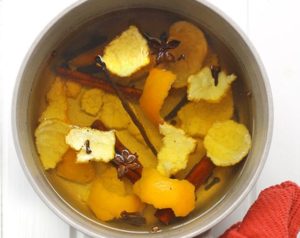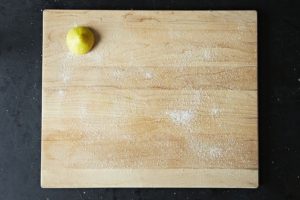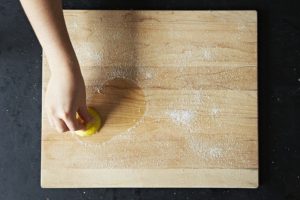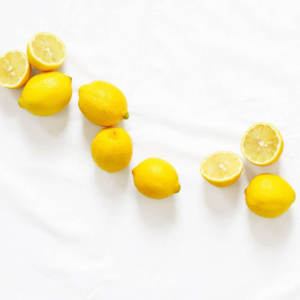
March is Citrus Month!
Let’s explore why citrus fruits are so nutritious, what recipes will highlight their taste and benefits, and how you can work toward an eco-friendly home by swapping chemical cleaners for natural ones.
∗ Health Benefits ∗
Eat your vitamins instead of relying on supplements!
Citrus fruits are a great source of vitamin C and fiber. Consuming the entire fruit, rather than drinking the juice, will give you the most nutrients. Citrus fruits will contribute to glowing skin by supporting a healthy gut, providing hydration, and boosting collagen.
Vitamin C is a water-soluble antioxidant that enhances the production of collagen, aids in iron absorption, and can shorten the length of the common cold. A small tangerine contains 20.3 milligrams of vitamin C, and a medium orange contains about 70 milligrams. The recommended daily intake of vitamin C ranges from 65 mg to 120 mg.
Fiber is a crucial part of a healthy diet by contributing to healthy digestion and regulating cholesterol levels. Fiber will also help you feel satiated throughout the day, making citrus fruits a beneficial addition to breakfast and a convenient afternoon snack. The recommended daily fiber intake is about 30 grams, and a medium orange contains roughly 3-4 grams. Remember there’s fiber in the pith, the white layer between the peel and the fruit, so don’t discard it!
Citrus fruits also contain magnesium, potassium, and folate.
∗ Citrus Juice & Green Tea ∗
According to ABC News, adding lemon juice to your green tea helps your body absorb catechins, a natural antioxidant that aids in cell repair. Vitamin C helps keep catechins in your system even after digestion.
∗ Citrus Juice & Plant-Based Iron ∗
Vitamin C can help break down the iron in veggies so that our bodies can better absorb it! Make sure to add some fresh lemon juice to your spinach salads to reap all the benefits.
Storing Citrus Fruit
On the counter: Leave citrus fruits on the counter, away from heat and sunlight, if you plan on eating them within 7-10 days. Place the fruit in a single layer, preferably in a ventilated dish/bowl that allows for airflow. Try not to pile them on top of each other and do not prewash the fruit – avoiding moisture will inhibit the growth of fungus.
In the refrigerator: Citrus fruit will keep longer if stored in the crisper drawer, up to two weeks. Bring the fruit back to room temperature to restore the flavor subdued by refrigeration.
Tips
- Organic is best! Especially if you plan on utilizing the peels.
- Always wash the outside of the fruit before enjoying – even if you do not plan on using the peels.
- To retain the nutrients consume the fruit raw. Heating citrus fruits, especially boiling, will lower the vitamin C content. This rule applies to all fruits and vegetables that contain vitamin C – steaming is the best cooking method for preserving vitamins.
- Don’t judge an orange by its peel! The peel of citrus fruits may look a little shriveled but will still be juicy on the inside. You’ll know the fruit is past its prime when it becomes too soft, has a sour smell, or develops a white mold.
- KEEP THE PEELS. Store citrus peels in a reusable ziplock bag in the freezer or an airtight glass container in the cupboard if you are not going to compost them.
∗ Recipes ∗
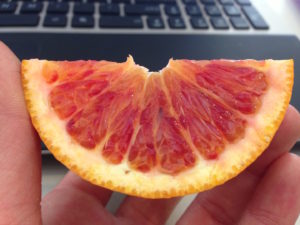
Nature’s Fast Food:
Don’t forget that oranges, clementines, and tangerines are perfect on the go snacks.
Nature has conveniently prepackaged citrus fruits in their own biodegradable peels! Pick a piece of citrus for an easy after-school snack, road trip munchie, or a midday pick me up at work.
Since citrus in the raw form is best for you, we have compiled
a collection of recipes that employ all types of citrus!

Endive Salad
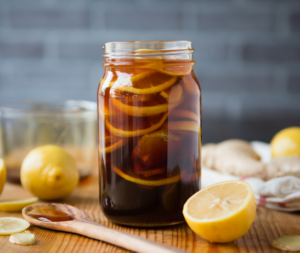
Lemon Honey Cough Remedy
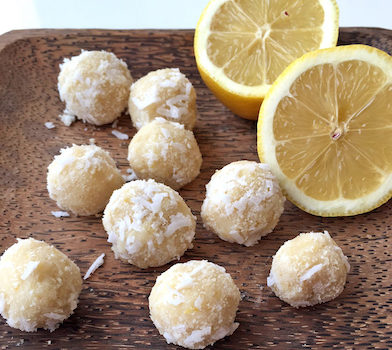
Lemon Coconut Energy Bites
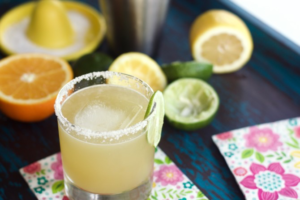
Citrus Margarita
Click here for delicious snacks and dishes!
Try incorporating citrus into your drinks. This collection includes cocktails and non-alcoholic beverages, with some immunity boosting blends.
Wondering what to do with leftover citrus peels?
Make your own candy! Smitten Kitchen has a simple recipe for making candied orange peels dipped in chocolate. You can use the peels from any citrus fruit.
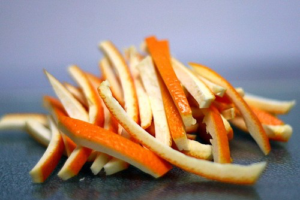
You’ll need your leftover orange peels, 8 ounces of sugar, and 16 ounces of your favorite chocolate (dark chocolate pairs well with citrus).
Just slice the orange peels into strips, boil them twice to remove the bitterness, and simmer in simple syrup for one hour.
Full recipe: Orangettes from Smitten Kitchen
Try this recipe from Giada De Laurentiis and make your own Limoncello.
Make this now since it takes 4 days for the peels to infuse the vodka!
Store the finished mix in the refrigerator for up to 1 month.
Serve chilled as a digestif or add 1 oz of limoncello to sparkling wine to create a bright mimosa.
Make an air freshener – perfect for when you’re hosting a party.
Use a pot on the back burner of the stovetop or an open crockpot.
Fill two-thirds with water and bring to a boil.
Add citrus peels and a couple of cinnamon sticks. Optional: a few drops of vanilla extract, whole cloves, or bay leaves.
Boil for a few minutes, then reduce the heat to a simmer. Remember to check on the mixture, about every thirty minutes, and add water when needed.
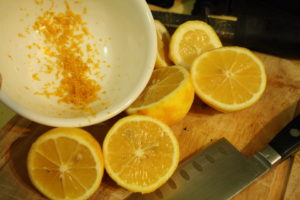
You can also pre-zest the citrus and store it in the freezer like the peels. Keep the zest in an airtight container. Now you will always have zest on hand for when a recipe calls for it!
Or, use some of the citrus peels in the cleaning products listed below ↓ ↓ ↓
∗ Make Your Own Cleaning Products ∗
The citric acid in lemons acts as a powerful remover for acidic (wine, coffee, sweat) and alkaline (limescale, rust) stains. Lemons also have antibacterial properties that can help make some pathogens inactive. Make the switch and try low waste, eco-friendly alternatives into your home.
Using the peels:
- Use citrus peels to deodorize your garbage disposal.
- Make an all-purpose cleaner:
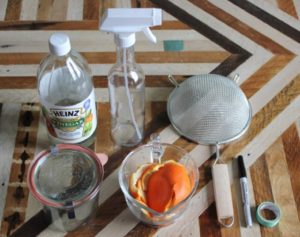
Apartment Therapy has a wonderfully detailed post about how to make your own cleaner using citrus peels and distilled white vinegar. The mixture has to sit for two weeks, so make it now as you begin to run out of your store-bought sprays! You can also reuse your previous spray bottle, instead of purchasing a new one, just make sure to rinse it clean. Similar to lemons, white vinegar’s acidity makes it a great cleaner.
Using the whole lemon:
- Faucets:
- Use half a lemon to remove soap scum and hard water stains – rub it directly onto your faucet.
- Tough stains:
- Sprinkle half a lemon with baking soda to help remove extra difficult stains on dishes or other hard surfaces.
- Test a small area first – lemon and baking soda a pretty abrasive, I would not use this method to clean my wooden coffee table!
- Hard to clean gadgets:
- Cut a lemon in half and grate the flesh on all sides of your cheese grater. Rinse clean.
- Clean and sanitize your wood cutting board.
- After rinsing clean, sprinkle the board with a decent amount of kosher salt.
- Rub with half a lemon.
- Rinse and always let dry in an upward position.
- Food52 created a post detailing how to care for your wooden cutting boards, from removing tough stains to conditioning them!
Using lemon juice:
- ∅Bleach∅:
- Fresh lemon juice + sunshine = natural bleach. If you have the luxury of hanging your linens outside, then this is a great way to whiten without using harsh chemicals.
- Add a cup of lemon juice to your laundry to boost your laundry detergent.
- Glass cleaner: Ditch the Windex!
- In a spray bottle add 3 tbsp of fresh lemon juice and water.
- Shake it up.
- Spray on the glass surface.
- Wipe with a microfiber towel or buff with newspaper, if you have it.
- Make this in a small batch – it will get rancid after a couple of weeks.
- Clean the microwave: from The Kitchn
- This is a job that no one enjoys but you can make it easier with lemon juice.
- Put 1/2 cup of water in a microwave safe bowl.
- Cut a lemon in half – squeeze the juice into the water and add the rest of the lemon into the bowl.
- Microwave on high for 3 minutes.
- Leave in the microwave for 5 minutes – do not open the door or else the steam will escape.
- Wipe clean. If there are stubborn spots – dip your cloth into the lemon water and scrub.
References:
https://food52.com/blog/16083-should-you-refrigerate-citrus-fruitshttps://www.livestrong.com/article/380506-the-best-vitamin-c-dosage-for-adults/https://www.medicalnewstoday.com/articles/321993.phphttps://cleanmyspace.com/10-things-you-can-clean-with-lemon/https://www.thekitchn.com/what-makes-lemons-good-cleaners-236458https://abcnews.go.com/Health/Healthday/story?id=4509470&page=1


